Minds of the Movement
An ICNC blog on the people and power of civil resistance
by Giorgi MeladzeAugust 01, 2023
ეს არის სტატიის "დავძლიოთ ენობრივი „ფარდა”, დავწეროთ საქართველოს არაძალადობრივი მოძრაობის ისტორია" ქართული თარგმანი. 2023 წლის 1 აგვისტოს (ინგლისურად აქ). თარგმნა გიორგი მელაძემ.
Earlier this year, in a meeting with students and colleagues here in Tbilisi, Georgia, we came to a consensus that many important civil resistance stories related to decision-making, specific tactics and defining strategy are frequently lost here. We—activists engaged in movements for democracy, environmental justice, good governance and more—are not writing or documenting enough to create transferable knowledge, so future generations will not know about our country’s civil resistance stories.
But with no local resources available to support such “knowledge management” actions, how can we affirm our nonviolent history in the interest of advancing our struggles?
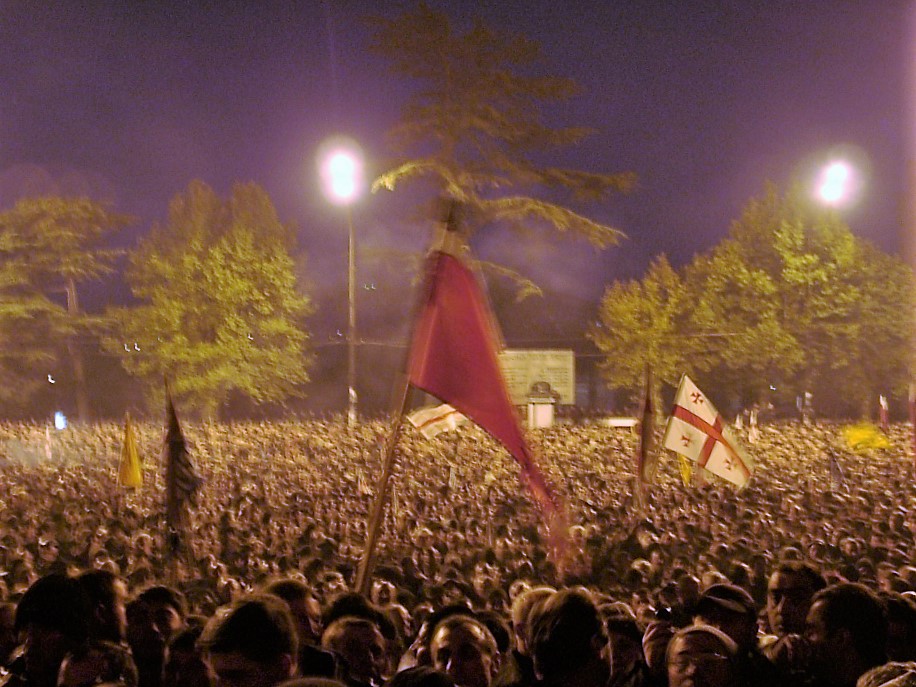
Nonviolent struggle is a blur for many when recalling Georgia's past. Tbilisi, Rose Revolution, November 23, 2003. Credit: Zaraza (CC BY SA 3.0, unedited).
TV media here act like a strainer, receiving everything but unable to hold perhaps the most fleeting material of our recent history: self-organizing and nonviolent struggle. We can’t count on social media either. Rife with spam, trolling and fake news, those channels have become impassable forests where even the skilled guide is sure to get lost.
Aggregation of movement reporting that is anchored in a civil resistance perspective is vital to preparing future generations to continue carrying on toward a more democratic Georgia. And we, Georgian activists, can be doing more in this regard: namely, creating an oral history of civil resistance but also leaving written, visual and other physical traces of our organizing, our challenges and our impacts—the latter of which is quickly discarded or replaced by other developments.
This blog post aims to explore several obstacles to affirming Georgia's nonviolent history. Activists in other world regions surely experience many of the specific obstacles I describe below, all of which stem from what I call the "language curtain", or how linguistic isolation hampers our progress as movements.
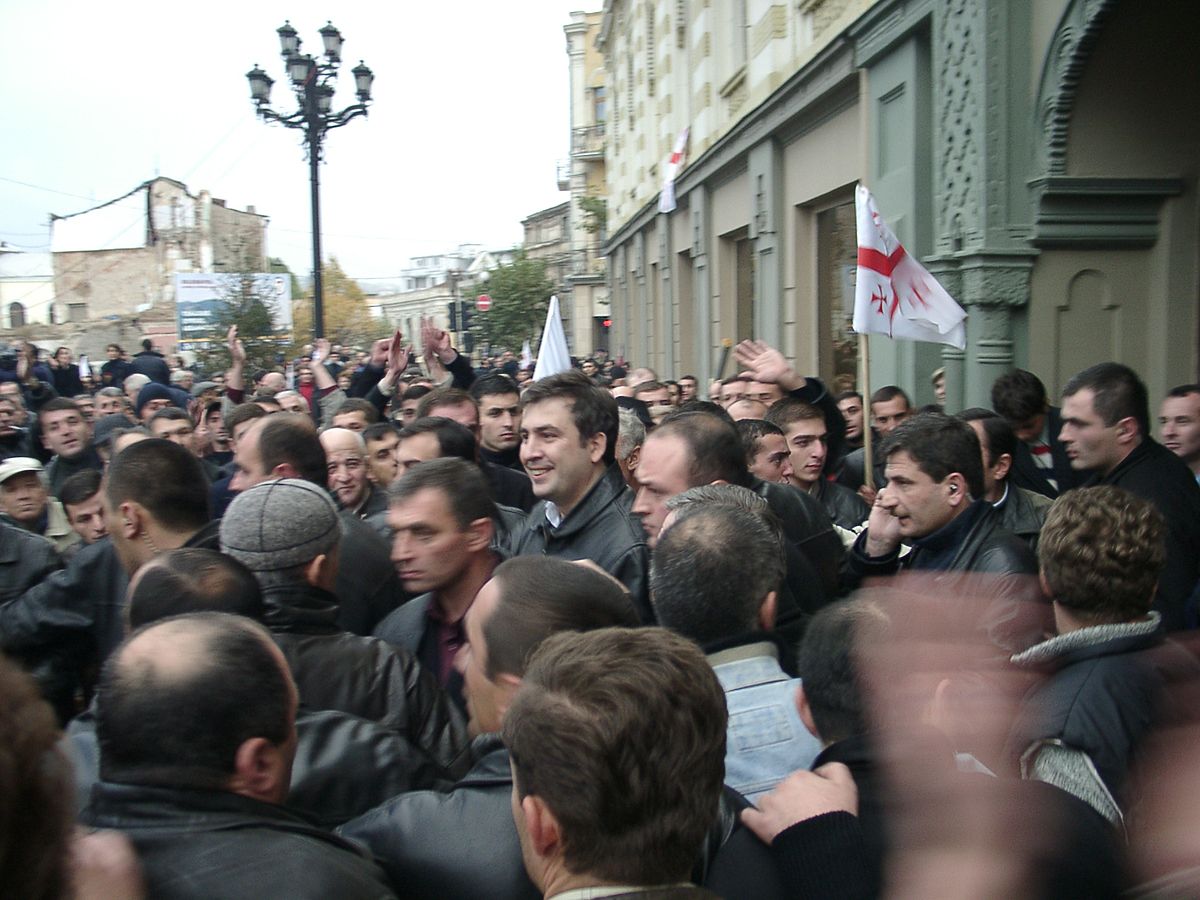
Opposition leader Saakashvili in Freedom Square during the 2003 Rose Revolution in Tbilisi. Credit: Zaraza (CC BY SA 3.0, unedited).
Obstacle #1: The language curtain disrupts information flow into movement circles.
Resources describing Georgia’s recent history of civil resistance movements are, ironically, mostly in languages other than Georgian. Unfortunately, most Georgians only speak Georgian, which excludes them from the modern information society and limits their ability to engage in civil resistance conversations happening worldwide. Those conversations would be directly relevant to their struggle and their daily lives.
The knowledge of foreign languages has always been a central pillar for building civil society in Georgia. As donors first started to explore the land behind the “Iron Curtain” in the 1990s, those who were able to speak English, French and German were the ones who were able to build solidarity networks. This was only a minority of the Georgian population, and for years civil society organizations remained isolated from the the rest of the globe.
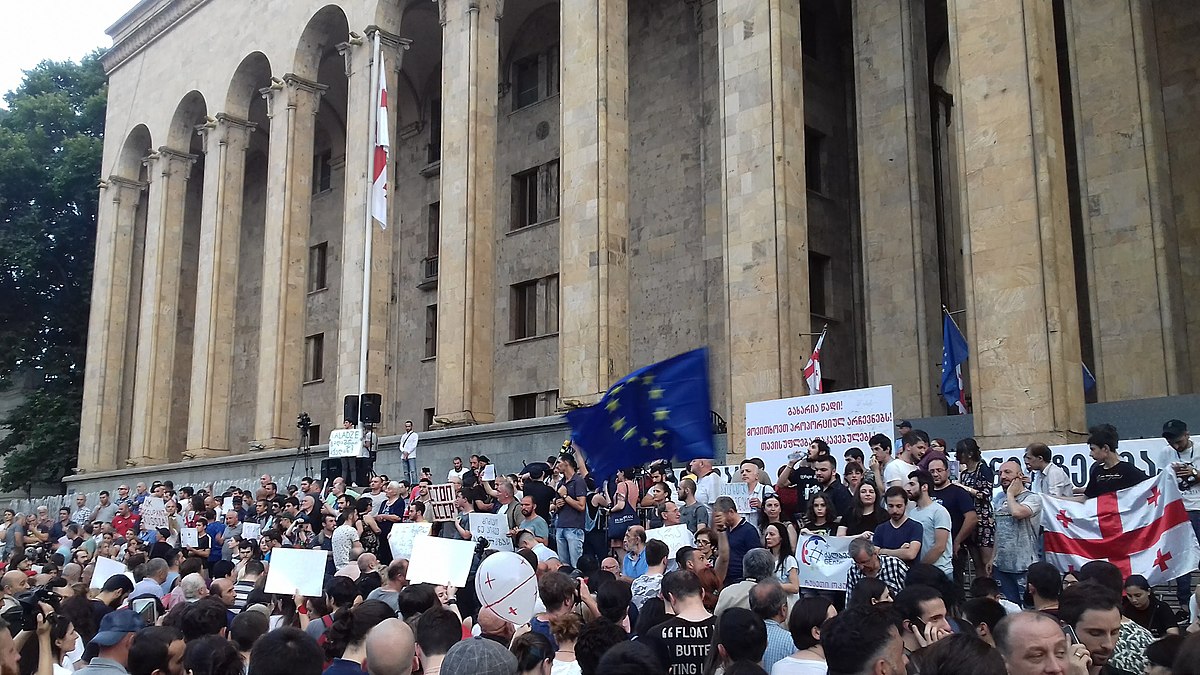
Georgia has had many other nonviolent uprisings since the 2003 Rose Revolution. In June 2019, Georgians protested Russian occupation and government policies. Credit: Kober (CC BY SA 4.0, unedited).
Obstacle #2: Georgia's rich nonviolent history remains concealed behind the language curtain—both for Georgians and the international community.
We observe the same trend with regard to knowledge transfer. Only those who are well-versed in many languages can truly grasp knowledge of Georgia’s civil resistance movements. Others remain largely excluded from these important episodes of recent history.
What’s more, the language curtain works in both directions. What I mean is that many activists are engaged in movements for democracy, against corruption, to protect the environment and for other social justice issues across Georgia. However, the international community might never think so because few of us are able to talk about them in the major international languages. I find it unfair that only a few Georgians who can communicate in foreign languages are recognized as either leaders or contributors to movements here.
The media have frequently contacted me simply because I speak English. When activists are cut off from communicating outside the Georgian-speaking sphere, their stories are lost, and one can never recreate the original story without being present.
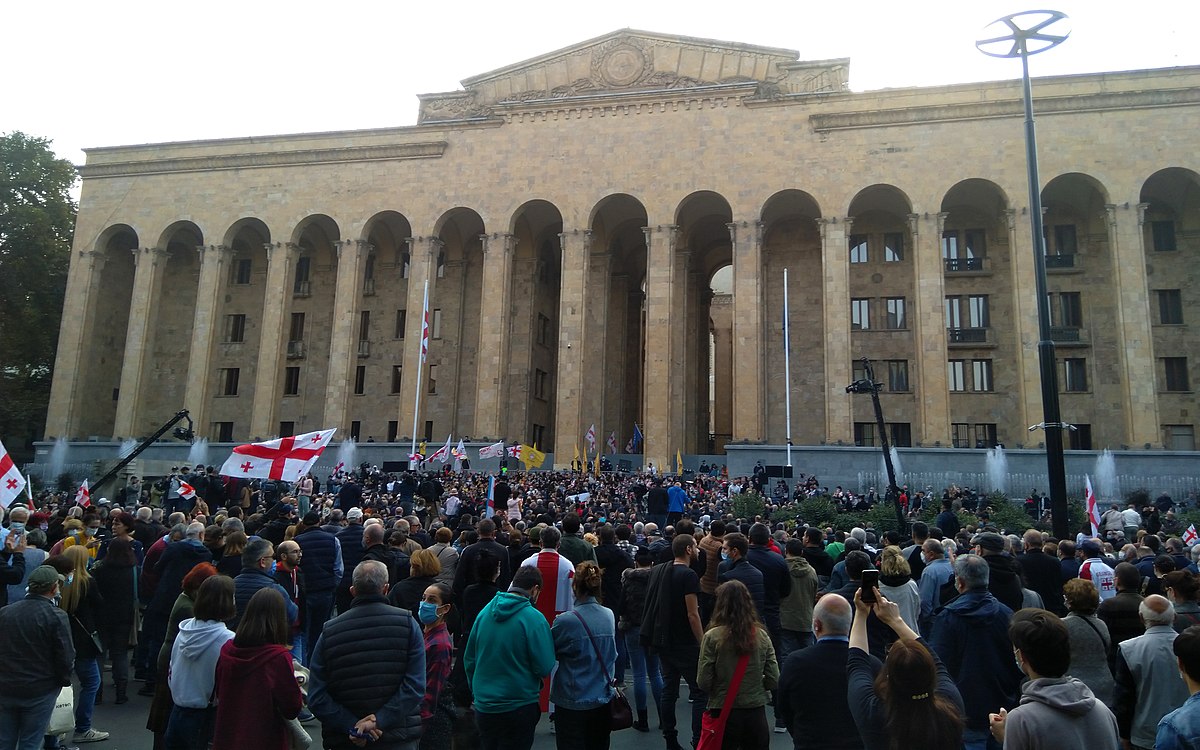
Georgia Parliamentary Elections, November 2020. Credit: Jelger Groeneveld (CC BY 2.0, unedited).
Obstacle #3: With the language curtain closed, nefarious actors take the scene and influence public opinion.
The language curtain is an enabler of misinformation and disinformation campaigns, both common tactics from the authoritarian playbook. The website mdfgeorgia.ge and many other sources have documented the teams of trolls that occupy communication channels and manipulate news information here. In addition, I am a member of the Kmara (Enough!) movement, a civic youth movement, and over the past 20 years it has become evident that the story of the Rose Revolution in particular has been subject to government media manipulation. Lastly, small interest groups called the “Radical Minority” also take advantage of our linguistic isolation and try to impose their agenda on the democratization process.
In the end, we must ask ourselves: Who benefits most from the language curtain, which essentially functions as a media blackout or censorship? It is authoritarian regimes. The lack of a recorded movement history available in our language makes such a malicious practice possible (among other factors). The mistakes of the past should not be repeated if Georgia wants to build a thriving civil society.
Obstacle #4: The language curtain shuts journalists out from receiving training in the strategic dynamics of civil resistance.
Many journalists lack knowledge to be able to identify key movement developments (for example, Bill Moyer’s eight stages of a movement) and appropriately frame key issues (for example, highlighting the role of corruption in a country’s political strife). This poor knowledge is related to lack of information in Georgian, and thus we find ourselves in a vicious circle.
Without knowledge sharing in a local language, we are missing out on a chance to amplify the stories and events that played a crucial role in campaign building or dismantling. What's more, those stories are often downplayed by mass events at a later stage and ultimately disappear from official history. For example, in 2022, a mass gathering in front of the Georgian Parliament protested the “Russian government”. The number of participants was unprecedented in Georgian history. The campaign organizers failed to come to a consensus on major demands and as a result the gathering split into small groups and faded. The organizers gave no public explanation and the story of what happened on the backstage remains untold.
As time passes, the chance to recreate the process and learn from the mistakes will be lost forever. It is small events and experiences like this that help to build large movements, and unfortunately those stories are lost if not documented in a timely manner.
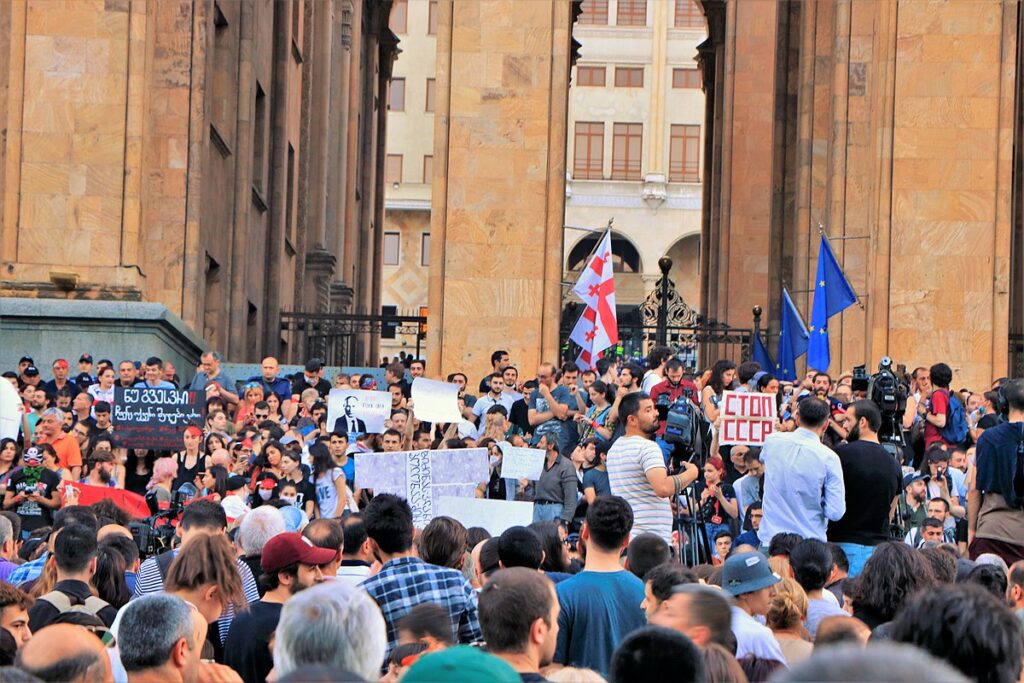
Gavrilov's Night Day 2 (2019 protest in Georgia). Protesters are holding signs saying "don't shoot" and "stop USSR". Credit: George Melashvili (CC BY SA 4.0, unedited).
Writing your own nonviolent history
Democratization and development are difficult endeavors, and Georgian history reflects this fact. However, the process can be even more difficult for those who lack tools and instruments for overcoming these obstacles. Foreign languages are one such instrument.
The Georgian language is among the oldest in the world. It brings our nation together, is the daily language for most of our population and is the language in which our past has been recorded. ICNC has contributed to developing training materials in Georgian, but it is a drop of water in the ocean if not followed up by local reporting, debate and information exchange. These should be our priorities as activists, because the effects can be far-reaching.
I think there is a way to address the problem and it is to tell our civil resistance stories in our language, to make it a tradition to record as much as possible about our movements' activities. We must document our own nonviolent history as it is happening—whether it is an oral or written history. That way one can later translate those stories and share them with the international community.
Yes, we live in a repressive context, but reporting is still possible (for example anonymous reporting)—at least that way there is still a chance to recover that history once the regime falls.
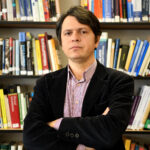
Giorgi Meladze
Giorgi Meladze is Associate Professor at Ilia State University School of Law in Tbilisi, Georgia. He is a former member of the KMARA movement, a civic youth movement against Shevardnadze’s rule in the early 2000s. He has extensive experience in training grassroots groups and human rights activists locally and internationally. Currently he is one of the organizers of the ჯიუტი/GEUT (“Stubborn Resistance”) movement in Georgia.
Read MoreYou may also like:
Georgia’s Pro-Democracy Movement in Full Swing as 2020 Elections Approaches
Fifteen Years after Georgia’s Rose Revolution, the Country’s Grassroots Wage Nonviolent Struggle against Police and Elite Corruption
Small Victories and Stumbling Blocks: Georgian Activists Mobilize to Protect their Environment